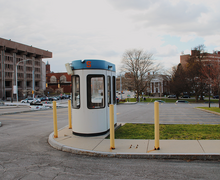Gutierrez: McDonald’s attempts to rebrand through charitable initiative
McDonald’s was the first restaurant to use the assembly line system, transforming the fast-food industry. Now, the iconic chain is setting a trend once again.
The United Nations World Food Program announced last week that McDonald’s, along with other large firms, will lead a multi-million dollar effort to promote global migrant aid. The global refugee crisis has led to millions of people being displaced, and comes with opportunity for corporate entities to offer support where it is needed most. According to The New York Times, McDonald’s will donate paid television airtime and digital media access to promote the U.N. food program and, in turn, aid the current migrant crisis.
McDonald’s appears aware that it needs to rebrand itself, and the restaurant is turning to humanitarian efforts to make this happen. By becoming involved in the worldwide push to aid in the refugee crisis, the iconic fast-food chain is an example for what other large-scale businesses need to be doing. The model is a win-win: improved financial performance on behalf of companies while contributing to a greater good.
Will Geoghegan, an assistant professor of management in the Martin J. Whitman School of Management, believes events like the crisis in Europe “seem to be something [firms] can really get some good public relations out of.”
He added that corporate social responsibility has become a hot-button topic, as firms are starting to see that when they prioritize human rights before financial gain, those ideals can drive profits.
In the midst of reshaping its corporate identity, McDonald’s is striving to reconnect with its diminishing clientele. The company replaced its chief executive earlier this year and next month plans to institute all-day breakfast at all of its locations. McDonald’s humanitarian efforts add to this reshaping.
But despite these efforts, McDonald’s is struggling to keep up.
Rival chains, including Chipotle, Shake Shack and Chick-fil-A, are attracting a young customer base with healthy options. McDonald’s is trying to meet this new appeal with plans to release an all-organic burger next week in Germany.
McDonald’s has also lost the “fast” in fast food. Customers placing orders in drive-thrus ten years ago would have their meals in 152 seconds, but today it takes up to 189.5 seconds. Chick-fil-A, on the other hand, typically gets its customers their meals within about 90 seconds of ordering.
In attempts to rebrand itself, McDonald’s is setting a precedent for big corporations to benefit society through business. It’s a virtuous cycle where socially responsible behavior improves financial performance. Help society, create a positive image, improve financially. Bam.
“There’s a thing called the profit-paradox,” said Geoghegan, who has delved into many case studies on the topic of corporate social responsibility. “Companies that run exclusively with profit as their motive are usually the least profitable. The companies that really do engage in [corporate social responsibility], and engage in this whole stakeholder partnership, are usually the ones that are the most successful.”
Of course, McDonald’s has been criticized for its environmental record and accused of misleading customers about nutritional information. But its refugee initiative could very well erase the public’s negative image of the corporation.
Matthew Gutierrez is a freshman journalism and entrepreneurial management dual major. His column appears weekly. He can be reached at mguti100@syr.edu and followed on Twitter @MatthewGut21.
Published on September 27, 2015 at 10:25 pm





